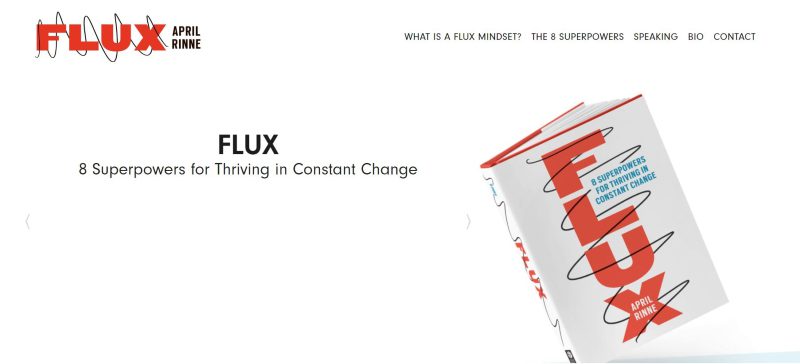We often talk about the importance of having a web presence, or an online home (your website) where people can find you, gather more information, and sign up to stay in touch with you. As an author, this is critically important. Sure, people can find you on social media (which is one piece of the puzzle), but your entire audience may not be on those platforms, and you don’t own or control those platforms. What happens if something goes awry and you can no longer access your content, or stay in touch with your networks? This is why we recommend having an online home.
Now, there are two main schools of thought when it comes to author websites: you can house all of your content, books, and information under one domain. Or, you can have different domains for your different books (if you’ve authored more than one) or for the work you do in the world.
We talked with April Rinne, author of FLUX: 8 Superpowers for Thriving in Constant Change, about her web approach.
What was most important for you in building a web presence for your forthcoming book?
I wanted my book to convey the message of Flux clearly and elegantly. I hoped to excite and inspire people to think about their relationship to change, to provide useful content (for potential readers, media, etc. – even if they don’t read the book), and to connect the concept of Flux back to me.
What do you hope to accomplish by having a separate web presence for your book?
This was a decision that I and my amazing designer, Elan Morgan, took seriously. At the beginning I was not sure if I would have one site (i.e. book featured somewhere on my April Rinne website, or a new stand-alone Flux website. But the more we discussed options, the clearer it became that having a stand-alone website for Flux was the better option. Among the factors that influenced this decision are:
- There is already a lot of information on my April Rinne website. Adding Flux could both make it cluttered / overwhelming, and dilute the power of Flux. With a stand-alone site, I was far less restricted in terms of how much could be shared.
- My personal and book websites have different branding, but they are complementary. They link with each other. Think 1+1=11!
- Flux is my book, but it is about far more than me. A separate site allows me to go far beyond what I might put on my personal website… opening new doors, which I love.
- My personal website has received extremely good feedback over the years. I didn’t want to mess with a good thing. Again, part of why it works well is because it’s clearly presented and not overwhelming. There was concern that a book—and all the information I wanted to include alongside it—could make it cluttered and lose some of that value.
How do you envision your two websites contributing to your overall work?
My personal website allows people to get to know me, even beyond Flux. It’s my full personal story (i.e. less emphasis on my professional bio), my advisory work, things I’ve written (not about Flux, per se), etc…. even my handstands around the world! Not all of that makes sense for a book website. My Flux website, in contrast, is exclusively about my book, the Flux message and concept, Flux Mindset and Flux Superpowers, etc. With time it will also include more Flux press, etc. as well. Flux links back to who I am—and how and why I wrote the book—yet it also goes beyond it. Both clearly contribute to my work, by focusing on different aspects of it. Again, I hope it creates a kind of 1+1=11 momentum!
What, if any, advice do you have for other authors about how to view their web presence for their book(s)?
It depends on what kind of book you’re writing, of course, but I always try to show up fully for my websites. What conveys the essence of me and the ideas I’m trying to get into the world? It’s important to have clear, clean site navigation and such, but beyond that…what makes you, you? Put that on your site. I’ve often been told that my sites show my personality and authenticity. I love that. Cookie-cutter websites aren’t interesting. Sites that are merely advertisements aren’t interesting. Make your website an extension of you—be more creative than you might otherwise be—shine and share that with the world!
No matter which option you choose (one website or multiple) you ultimately have to do what is best for you, your brand, and your book or business. However, I’d like to leave you with one piece of advice: make it easy for people to find out more about you, stay in touch, and connect with you (like April has done).
If you’re an author or aspiring author and would like to strategically weigh your options as it relates to your web presence, we’d love to hear from you. Email Becky Robinson at [email protected].
More about April Rinne
A World Economic Forum Young Global Leader and ranked one of the “50 Leading Female Futurists” in the world by Forbes, April Rinne is a change navigator: she helps individuals and organizations rethink and reshape their relationship with change, uncertainty, and a world in flux. She’s a trusted advisor, speaker, investor, adventurer (100+ countries), insatiable handstander, and author of Flux: 8 Superpowers for Thriving in Constant Change (on-sale August 24, 2021). Learn more about her (two!) websites at fluxmindset.com and aprilrinne.com.

Aubrey drives successful social media strategies that improve client visibility, position clients as thought leaders, and set them apart in the market. She effectively manages client accounts to ensure a tailored marketing approach that aligns with overarching goals, target audiences, and budgetary parameters.

